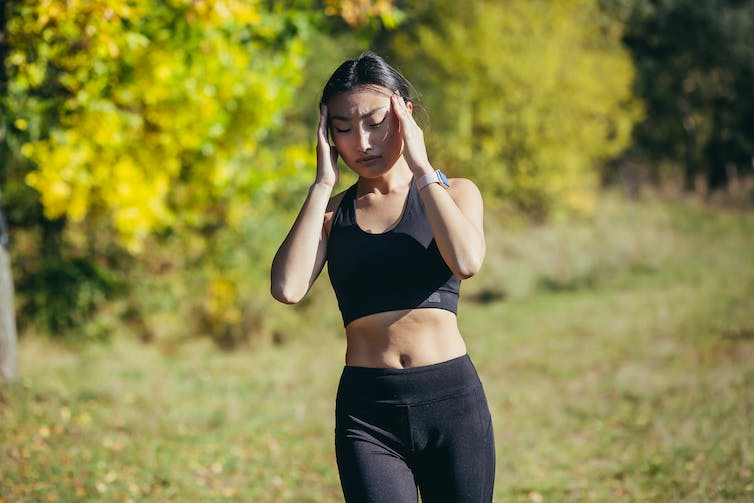
For some people, going for a run can trigger what’s known as a “runner’s high”, a short-lasting feeling of euphoria or relaxation. But for others, running can trigger something far less pleasant: a headache.
Exercise or exertion headaches were first described by researchers in 1968. They occur during or after a period of intense, strenuous physical activity – such as running, sneezing, heavy lifting or sex.
While symptoms vary from person to person, exertion headaches typically involve a pulsating feeling on both sides of the head, which some describe as similar to a migraine. They can last anywhere from a few minutes to a couple of days. Some people may also experience multiple headache episodes.
But despite affecting an anywhere between 1% and 26% of adults (and up to 30% of adolescents), there’s still limited scientific data on exertion headaches.
This may be because they aren’t significantly painful enough to stop people exercising, they cease when people stop exercising or because the symptoms overlap with those of other headaches (such as migraine), meaning people are treated for those instead. So in all likelihood, they could be more common than we think.
But where studies with small numbers of people have been done, such headaches appear to be most common in people aged 22 to 40, though they most often begin before the age of 30.
Men in these studies were also more likely to suffer them, accounting for around 80% of the small number of sufferers taking part. More research will be needed to establish more clearly whether men are more likely to have them and, if so, why.
Why they happen
When we exercise, blood flow to the brain increases in order to ensure it has enough oxygen to keep our body moving. But this also means there’s an increase in the amount of CO₂ and heat our brains need to get rid of. To cope with this, our blood vessels expand and this stretching can cause pain.
Since everyone has different anatomy and physiology, for some people the additional demands that exercise places on their circulatory system may be enough to trigger a headache. But for others, certain conditions may cause exertion headaches.
Exercising in hot weather is one example. The brain naturally runs at a hotter termperature than the rest of the body, and it cannot dissipate heat through the skin by sweating. The only way it can get rid of heat is by widening the blood vessels to increase blood flow to through the brain, helping to take away some of the heat.
Since hot and humid weather already increase the brain’s temperature, adding exercise into the mix only makes it hotter, leading to an even greater swelling of our blood vessels to cope. This may explain why some people only get the characteristic pulsating headache when they exercise on a hot day.

voronaman/ Shutterstock
Training at altitude also increases the likelihood of exertion headaches. This is due to the reduced oxygen-carrying capacity of the blood at altitude. This means more blood has to go to the brain to supply all the oxygen it needs, causing swelling and triggering pain.
People with a personal or family history of migraine of migraine may also be more likely to get exertion headaches. This is probably because the same changes that bring on migraines – such as changes in blood vessel size – are also involved in exertion headaches.
How to prevent them
Exertion headaches will resolve shortly after stopping exercise. This will usually be within an hour or two, once your heart rate has decreased and there’s less demand for oxygen from the brain.
But if your headache is also linked to dehydration, it will probably take a bit longer to resolve until you’ve replenished your fluid levels. This typically takes about three hours.
If symptoms do persist or your headache is particularly painful, over-the-counter pain medications – such as paracetamol or ibuprofen – may help. But if exertion headaches are a common experience to you, you might want to speak to your doctor about trying certain prescription drugs which may reduce symptoms and in some cases decrease chances of these headaches from happening.
There are also things you can do to prevent exertion headaches from happening the first place.
It’s thought that doing strenuous exercise after a long period of inactivity might cause exertion headaches, as your cardiovascular system is not fit enough to cope with the demands.
That’s why it’s good to ease back into exercise gradually if you haven’t exercised for a while. It’s also good to warm up gradually each time you exercise to help your circulatory system cope with changes in blood pressure and flow.
Staying hydrated is also important. This ensures the brain’s blood vessels can function properly. Adequate rest will also ensure the brain works at its best and help you feel less sensitive to pain.
Although exertion headaches are annoying, they shouldn’t prevent you from exercising, especially in warmer weather when they can be more common. Gradual warm-ups and avoiding hot days or altitude may help lower your risk of them happening. Trying other types of exercise which do not have a sustained peak heart rate level – such as yoga or weightlifting – may be beneficial.
![]()
Adam Taylor does not work for, consult, own shares in or receive funding from any company or organisation that would benefit from this article, and has disclosed no relevant affiliations beyond their academic appointment.






















